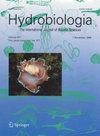研究能力差距阻碍了对气候变化对拉丁美洲太平洋沿岸生态系统服务影响的理解
IF 0.3
4区 生物学
Q4 MARINE & FRESHWATER BIOLOGY
引用次数: 1
摘要
背景沿海社区高度依赖生态系统服务,但人们从自然生态系统中获得的利益和生计直接和间接受到气候变化的影响。需要从机制上理解气候变化的组成部分如何转化为对生态系统和社会的可衡量的影响,这对于管理、规划和缓解最有可能的环境未来的能力至关重要,但热带和亚热带国家在这一领域的进展因缺乏地方和区域层面的研究能力而受挫。目标。在这里,我们调查了墨西哥和智利之间太平洋沿岸国家的研究能力,该地区拥有广阔的海岸线(23191公里),横跨11个社会经济发展状况不同的国家,预计特别容易受到气候变化的影响。方法。具体而言,我们的重点是探讨气候变化对生态系统服务(提供、监管和文化)的影响如何与美洲太平洋沿岸每个国家的研究能力和国内生产总值(GDP)相关。后果我们发现,自1980年以来,与该主题相关的同行评审科学研究的数量与GDP密切相关(r=0.90,p<0.05),拉丁美洲太平洋沿岸的研究工作(13.8项1000公里-1的研究)比邻近的加利福尼亚海岸(103项1000公里-1的研究)低一个数量级。结论。我们的研究结果强调,有必要更好地发展拉丁美洲-太平洋地区的研究,并就气候变化和生态系统服务之间的关键联系开展更多工作。本文章由计算机程序翻译,如有差异,请以英文原文为准。
Research capability gaps hinder understanding of the impact of climate change on ecosystem services in the Latin American Pacific coast
Background. Coastal communities are highly dependent on ecosystem services, but the benefits and livelihoods people derive from natural ecosystems are directly and indirectly affected by climate change. The need for a mechanistic understanding of how components of climate change translate into measurable impacts on ecosystems and society is fundamental to the ability to manage, plan and mitigate for the most likely environmental futures, yet progress in this area in tropical and subtropical countries is frustrated by a lack of research capacity at the local and regional level. Objectives. Here, we investigate the research capacity of the countries along the Pacific coast, between Mexico and Chile, a region with an extensive coastline (23,191 km) that spans 11 countries of varying socio-economic development status and anticipated to be especially vulnerable to climate change. Methods. Specifically, our focus was to explore how the effects of climate change on ecosystem services (provision, regulation and cultural) may relate to research capacity and gross domestic product (GDP) in each country along the Pacific coast of the Americas. Results. We find that, since 1980, the number of peer-reviewed scientific studies relevant to this topic strongly correlates with GDP (r = 0.90, p < 0.05) and that research effort is an order of magnitude lower along the Latin American Pacific coast (13.8 studies 1000 km -1 ) than in the neighbouring Californian coast (103 studies 1000 km -1 ). Conclusions. Our results highlight the need to better develop the research in the Latin America Pacific, and for more work on the key links between climate change and ecosystem services.
求助全文
通过发布文献求助,成功后即可免费获取论文全文。
去求助
来源期刊

Hidrobiologica
生物-海洋与淡水生物学
CiteScore
0.40
自引率
0.00%
发文量
8
审稿时长
>12 weeks
期刊介绍:
HIDROBIOLÓGICA es una publicación cuatrimestral que difunde trabajos originales e inéditos de investigación o revisión, sobre temas relacionados con los organismos y la hidrología de los ambientes acuáticos, dulces y marinos y va dirigida a investigadores de todo el mundo, interesados en las diversas disciplinas que incluye la Hidrobiología , así como a alumnos de posgrados y licenciaturas relacionados con la biología, ecología, taxonomía, filogenia y evolución de organismos acuáticos, e hidrología y oceanografía de ambientes s dulceacuícolas y marinos.
 求助内容:
求助内容: 应助结果提醒方式:
应助结果提醒方式:


